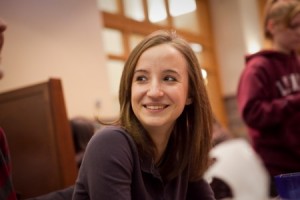
Ashley Juavinett '11
Ashley Juavinett ’11 has spent most of her life in a classroom. And if everything goes according to plan, she’ll spend a lot more time in classrooms in the future. Pursuing a Ph.D. in neuroscience at the University of California, San Diego, Juavinett hopes to one day become a professor at a liberal arts college.
Juavinett earned a Socrates Fellowship for the coming academic year. Sponsored by the National Science Foundation, the award provides full funding for one year of graduate school to UCSD Ph.D. students and stipends for San Diego-area teachers to work together to enhance the science classroom. Socrates Fellows and their teacher-partners also participate in a four-week summer institute prior to the academic year.
Working one on one with her teacher-partner at a high school in San Diego, Juavinett will develop curricula, teach classes, and design a project that introduces the high school students to her doctoral research. The first-year graduate student is rotating through various labs at UCSD before she selects a thesis lab this summer. Currently, she’s working at the Salk Institute in La Jolla, Calif., with Dr. Edward Callaway to study the visual system in mice.
“In my application for the fellowship, I directly cited my close experience with the professors at Lafayette as one of the reasons I wanted to gain formal teaching experience,” explains Juavinett, who earned a B.S. in neuroscience. “My hope is that this fellowship will put me on the right track so that one day I will be able to return the favor by teaching at a liberal arts college.”
Juavinett credits her undergraduate professors and mentors with turning her on to academic research and, perhaps more importantly, making sure she was prepared for a rigorous Ph.D. program. As a first-year student at Lafayette, she worked with Lisa Schrott ’87, associate professor in the department of pharmacology, toxicology, and neuroscience at Louisiana State University Health Sciences Center, Shreveport, through the LafayettE Alumni Research Network (LEARN) program, in which Lafayette students spend a summer internship with alumni in the neuroscience field.
“I owe a lot to Lafayette’s LEARN program,” says Juavinett. “I was only a first-year student, and that opportunity definitely put me ahead of the research experience curve.”
For her honors thesis, which was completed under the guidance of Elaine Reynolds, associate professor of biology, Juavinett used an interdisciplinary framework provided by sociology and psychology to inform a novel neuroscience approach to studying racial biases in the justice system. She presented the project at the Lehigh Valley Society for Neuroscience Conference at Lafayette and the Student Research in Social Justice Conference at Muhlenberg College. She also conducted research at the Columbia University Motor Neuron Center on the genetic basis of facial motor neuron development.
Along with Amanda Pisetzner ’10, she received a $10,000 Davis Projects for Peace grant to reduce recidivism among female inmates at Santa Cruz County Jail in California. They spent two months in the summer of 2009 providing educational programs and other resources to help the inmates transition from incarceration to life outside prison. Juavinett also volunteered at Northampton County Prison, teaching writing and book/film classes and running a self-designed music therapy class.
Juavinett was a finalist for the Marshall Scholarship, Goldwater Scholarship, Truman Scholarship, and Lafayette’s George Wharton Pepper Prize. During a semester abroad in Italy, she served as an intern for UNICEF and organized a benefit event for UNICEF’s efforts in Haiti at a local venue in Florence.
A former Student Government president, Juavinett was a volunteer with the Landis Community Outreach Center. The acoustic singer-songwriter was musical director for Cadence, the College’s female a cappella group, and released an album titled Twenty Miles to Freedom, which can be found on iTunes.
